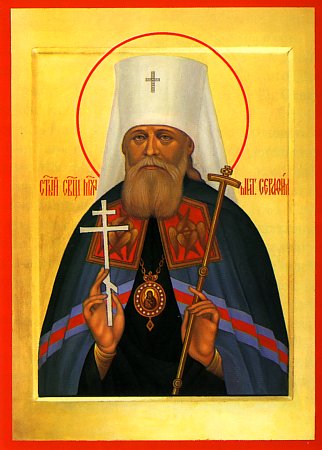Seraphim was from a prominent aristocratic family and had served in the Russian army during the 1877-1878 war with Turkey. He rose to the rank of colonel of artillery and was charged with organizing medical care and other charities for veterans, orphans of war, and families connected to the military forces. In 1891, influenced by the teachings John of Kronstadt, Seraphim moved to Moscow with his family to begin a life in the church as a member of the clergy. After the death of his wife in 1895, Seraphim was tonsured a monk and joined the Holy Trinity Monastery. In 1903, he supervised the ceremonies marking the canonization of Seraphim of Sarov.
In 1905, he was consecrated bishop. In 1908, he was appointed Bishop of Chisinauand then, in 1912, appointed Archbishop of Tver. In 1918, he was appointed Metropolitan of Warsaw, but was not able to reach his see because Poland would not grant him permission to enter the country.
In 1922, Seraphim was arrested by the Bolshevik government and was imprisoned. He was released in 1927 after he expressed support for the acting locum tenens Metropolitan Sergius (Stragorodsky). In, 1928, he was elected Metropolitan of Leningrad and Gdov. In 1929, Seraphim presided at the funeral of the martyred Archbishop Hilarion after he was executed by the Bolshevik government.
In 1933, Seraphim was arrested and imprisoned again, and then executed by a firing squad during the purges in 1937 at Shcherbinka, Yuzhnoye Butovo District, a place of mass executions.





